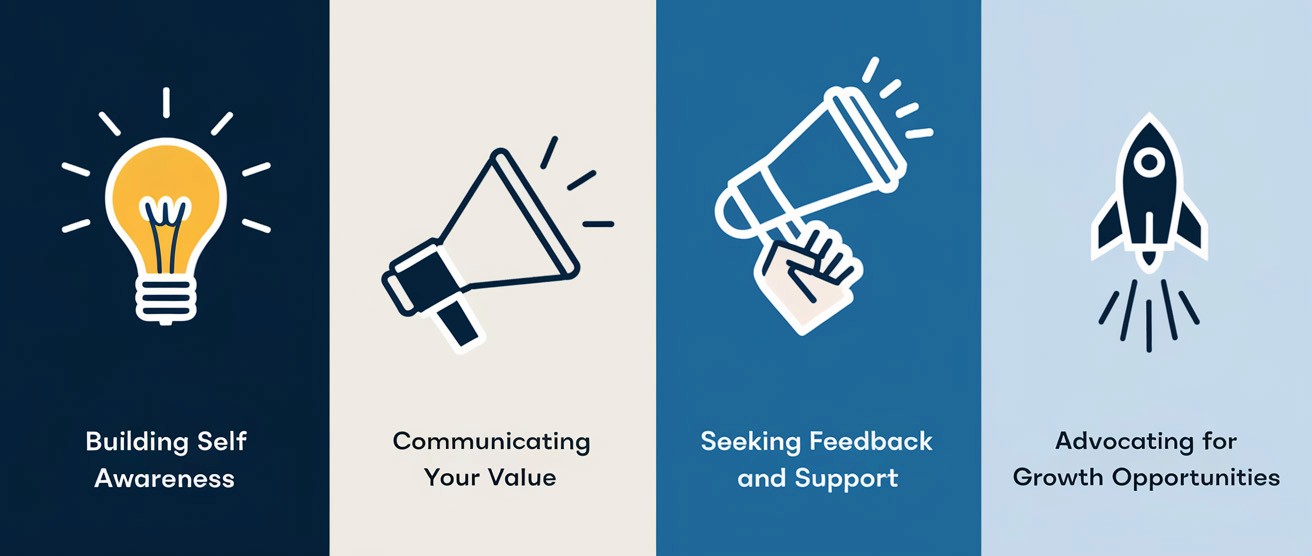Advocating For Yourself At Year End

Peter Walmsley

Dec 17, 2024
•
5 - 7 minutes
At year-end, people often experience a mix of emotions, reflections, and anticipations, influenced by the extent to which they have achieved personal goals, their workplace goals and anticipation about what the new year might bring.
There are so many thoughts and feelings which go through people’s minds at this time of year and some of those may include:
Reflecting on your accomplishments, missed opportunities, and growth throughout the year.
How many previously set goals were you able to meet; exceed or fall short of completing and why
Worrying about organizational restructuring or layoffs, which often happen at the end of fiscal years.
Speculating about potential raises, promotions, or new roles.
Reflecting on whether your current job aligns with your long-term career aspirations.
Anticipating year-end bonuses and how they will compare to expectations.
Feeling drained after a year of hard work, especially if deadlines, quotas, or projects pile up at year-end. You may struggle to juggle year-end responsibilities at work with holiday
Stressing around finishing tasks, closing projects, or meeting quotas before the year ends.
How often throughout our careers have we come to the end of the year and put faith in our managers or leaders believing that they will know how much we have delivered throughout the year and will give us the appropriate reward and recognition we deserve, only to have our hopes dashed. Too often managers do not have all the facts regarding how their individual team members have performed; what their expectations might be and how their team members may be thinking about their role and their future.
One thing I have learned over the years is that we all need to do a better job at advocating for ourselves as in the absence of anyone else doing it for us we have to assume the mantle of being the best advocate we can be for who we are; what we have achieved and what we are looking for from our career.
So how do we go about advocating for ourselves? What actions can we take?

Build Self-Awareness
This is about taking the time at year end and on a regular basis to know your strengths and focus on what you believe your skills to be; your accomplishments and unique contributions all backed up with specific and relevant examples to illustrate your point. This will help you to explain what impact you are having on the organization
It is also the time over the holiday to take a step back, think, and ask yourself what you want professionally (e.g., promotion, leadership opportunities, work-life balance).
Communicate Your Value
It is also worth keeping a record of successes, milestones, positive feedback and areas where you may have struggled and have learned from how you overcame the challenges as this will show you to be someone who takes a balanced view to their performance. This should involve being clear about the KPIs that were agreed on and how you have performed against them with specific results and ensuring you have a good discussion with your manager who needs to sign off on what you have achieved.
In addition, make sure you regularly update your manager on your contributions through one-on-ones, status reports, or project updates and be proactive about it.
Seek Feedback and Support
A key part of advocating for yourself is to ensure that you build strong relationships around the organization. It is important to cultivate strong connections with managers, peers, and mentors who can support and advocate for you. Often when it comes to review time or when it’s time to review promotions other managers are asked for their perspective on individuals across the organization so having people who can speak to your achievements and impact will be very helpful! Work hard at developing these relationships and remember that the relationships you build at work are business relationships and should not be seen as friendships. Although a few individuals here and there may indeed turn out to be friends, the bottom line is how you are contributing to the outcomes of the company.
It is also a good idea to request constructive feedback as this will help you identify growth areas and demonstrate your commitment to improvement.
Advocate for Growth Opportunities
It is important to initiate career conversations with your manager and talk through how you see your career unfold and ask for help; guidance and support to help you achieve your objective.
Part of these career discussions should also be about requesting training and development where needed and you should inquire about support for courses, certifications, or skill-building opportunities.
Finally, as part of your development, seek new challenges, i.e. Volunteer for projects that stretch your skills and align with your career path.
Advocating for yourself is about being proactive, intentional, and confident while balancing assertiveness with collaboration. By consistently taking these actions, you can create a career environment that supports your growth, recognition, and success. Take the time to reflect on your contributions to the business and their impact and prepare for your year-end review as well as setting the scene for how you want to own your performance in 2025 and be a strong advocate for yourself and your success.

